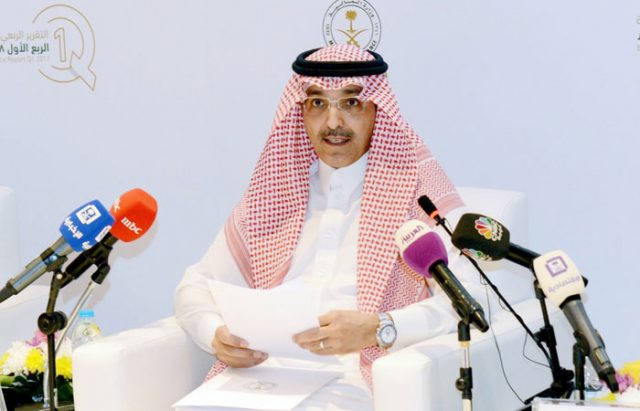
Budget deficit drops 71% in Q1
SAUDI ARABIA’S budget deficit fell by 71 percent in the first quarter of this year, Finance Minister Mohammed Al-Jadaan said on Thursday, after the Kingdom made sweeping spending cuts.
The deficit dropped to SR26 billion ($6.93 billion) in the first three months while compared to the same period last year following the cuts made as a result of the dramatic drop in oil revenues, Al-Jadaan told reporters during a press conference in Riyadh on Thursday
Al-Jadaan said his ministry has seen a SR144 billion in revenues and increase by 72 percent from last year’s figures.
The minister also announced that the first quarter’s expenses reached SR170 billion.
The Kingdom’s budget deficit was initially projected at $53 billion for this year.
There has been 115 percent increase in the oil revenues, reaching SR112 billion in the first quarter as against the same period in 2016.
Total non-oil revenues reached SR32 billion during the same time period.
“This is a very encouraging figure and clearly reflects our aim to achieve a balanced budget in 2020,” he said.
This is the first budget report released by the Kingdom, which earlier this month said it would begin issuing quarterly reports to boost transparency.
More transparency
“Our main focus is to achieve the Vision of Saudi Arabia 2030 and our ministry is working with both public sector partners to increase the workings of the private sector in the Kingdom,” Al-Jadaan said.
The minister also explained that the announcement of the budget figures aims at increasing levels of transparency as part of pledges made under Saudi Vision 2030.
“We are seeing much more transparency from the Saudi finance ministry compared to years past. This plays a huge role in key stakeholders across the Kingdom in terms of managing finances and expectations as we prepare for the rest of the year,” Mohammed al-Omran, CEO of AMAC Investments, told Al Arabiya.
Riyadh has moved to diversify its traditionally oil-dependent economy following the sharp fall in crude prices in 2014.
Last year, it announced a “Vision 2030” plan aimed at developing its industrial and investment base and boosting small- and medium-sized businesses in a bid to create more jobs for Saudis and reduce reliance on oil revenue.
In September, it froze salaries and reduced benefits for civil servants — who comprise the bulk of the workforce — as part of a package of austerity measures.
Custodian of the Two Holy Mosques King Salman restored those benefits in a royal decree last month.
In October, the Kingdom raised $17.5 billion in its first international bond offering.
High on the diversification agenda is the Kingdom’s plan to sell some five percent of state oil giant Aramco to private owners next year. In April, it cut taxes on oil companies in a bid to attract buyers.
Saudi Arabia has also announced foreigners would no longer be allowed to work in the Kingdom’s numerous shopping malls, in a measure to boost employment of Saudis.
About nine million foreigners worked in the Kingdom at the end of 2015, the most recent official figures available.
Saudi Gazette report
























